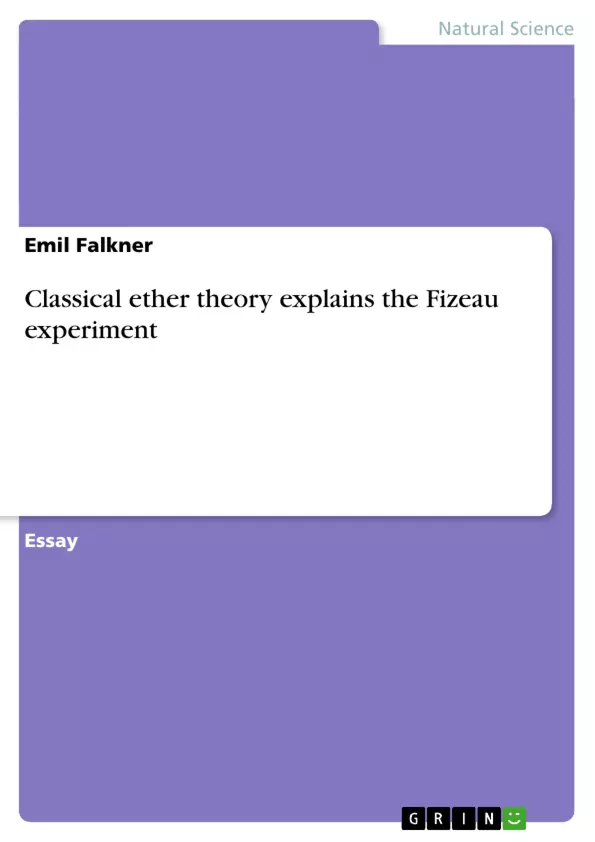Regardless of the fact that A. Michelson and E. Morley explained the Fizeau Experiment in a very simple classical way, this experiment is sometimes used to demonstrate the validity of special theory of relativity[4]. Because some other experiments show that Doppler effect, which is generated within moving Medium, influence the average speed of light, it could be rather interpreted as an argument against special theory of relativity. [...]
Inhaltsverzeichnis (Table of Contents)
- Abstract
- Introduction
- The Fizeau Experiment and Ether Drag Theory
- The Michelson-Morley Experiment
- Conclusion
- References
Zielsetzung und Themenschwerpunkte (Objectives and Key Themes)
This work aims to demonstrate that the Fizeau experiment can be explained by classical ether theory without relying on the principles of special relativity. It argues that the experiment can be interpreted as a confirmation of the theory of locally carried ether, which suggests that the ether is partially dragged by moving matter. Key themes explored in the text include:- The interpretation of the Fizeau experiment
- The role of ether in explaining the speed of light
- The limitations of special relativity in explaining the Fizeau experiment
- The significance of the Michelson-Morley experiment
- The relationship between mass and electromagnetic energy
Zusammenfassung der Kapitel (Chapter Summaries)
The abstract introduces the paper's focus: demonstrating that the Fizeau experiment supports classical ether theory and challenges the validity of special relativity. The introduction presents the Fizeau experiment, discussing the anomaly observed in the speed of light within moving water. The experiment results are interpreted in terms of ether drag theory, where the ether is partially carried along by the water. The limitations of Fresnel's theory due to frequency dependence are also acknowledged. The text continues by exploring the relativistic interpretation of the Fizeau experiment, specifically the limitations of relativistic speed addition and the implications for interpreting the experiment's results. This section argues for the plausibility of a gravitationally carrying ether theory, proposing that the ether's mass is influenced by electromagnetic fields present throughout the universe. The chapter proceeds to delve into the concept of two speeds within the flowing water: the speed of light in empty spaces and the speed of light bound to matter. The text explains how the speed of light in matter can be affected by movement while the speed in empty spaces remains unchanged. The chapter then develops a mathematical model to calculate the average speed of light in the moving medium, taking into account the different speeds in the material and ether portions of the optical path. This model incorporates the speed of the medium and the properties of the ether. Finally, the chapter explores the Michelson-Morley experiment, which aimed to measure the Earth's movement relative to a stationary ether. The results of this experiment are discussed in the context of the locally carried ether theory, further supporting the validity of this theory.Schlüsselwörter (Keywords)
The main keywords and topics of this work are: Fizeau Experiment, ether theory, special relativity, Doppler effect, Michelson-Morley experiment, Fresnel's formula, refractive index, speed of light, electromagnetic field, locally carried ether, gravitationally carrying ether.Frequently Asked Questions
What is the main argument regarding the Fizeau experiment?
The work argues that the Fizeau experiment can be explained by classical ether theory (specifically the ether drag theory) without the need for special relativity.
How does the "locally carried ether" theory work?
It suggests that the ether is partially dragged or carried along by moving matter, such as flowing water in the Fizeau experiment, affecting the speed of light.
What is the significance of the Michelson-Morley experiment in this text?
It is discussed as another key experiment used to measure Earth's movement relative to the ether, supporting the locally carried ether model.
Why is the Doppler effect mentioned?
The author states that the Doppler effect generated within a moving medium influences the average speed of light, which could be an argument against special relativity.
What is Fresnel's formula in this context?
Fresnel's formula relates to the drag coefficient of light in a moving medium, which the author re-evaluates through the lens of classical ether physics.
- Citation du texte
- Emil Falkner (Auteur), 2009, Classical ether theory explains the Fizeau experiment, Munich, GRIN Verlag, https://www.grin.com/document/137649



